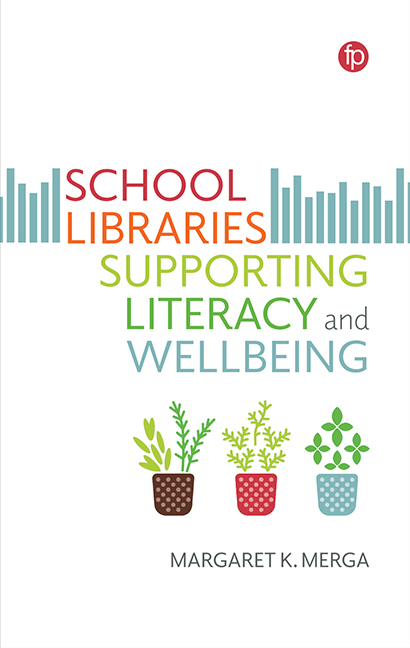Book contents
- Frontmatter
- Contents
- List of Tables
- Acknowledgements
- Abbreviations
- Introduction
- 1 What Do School Library Professionals Contribute to Student Learning and Support? A Focus on Australia and the UK
- 2 School Libraries and Reading Engagement for Literacy
- 3 Librarians Supporting Struggling Literacy Learners Beyond the Early Years
- 4 School Libraries and Reading Engagement for Student Wellbeing
- 5 School Libraries, Health Resourcing and Information Literacy
- 6 Librarians Creating Environments for Reading and Wellbeing
- 7 Challenges to Visibility and Advocacy for School Libraries and Staff
- Conclusions and Directions for Future Research
- Appendix 1 Background and Methods of My Research Projects
- Appendix 2 A Place to Get Away from It All: Five Ways School Libraries Support Student Wellbeing
- Index
Conclusions and Directions for Future Research
Published online by Cambridge University Press: 21 April 2022
- Frontmatter
- Contents
- List of Tables
- Acknowledgements
- Abbreviations
- Introduction
- 1 What Do School Library Professionals Contribute to Student Learning and Support? A Focus on Australia and the UK
- 2 School Libraries and Reading Engagement for Literacy
- 3 Librarians Supporting Struggling Literacy Learners Beyond the Early Years
- 4 School Libraries and Reading Engagement for Student Wellbeing
- 5 School Libraries, Health Resourcing and Information Literacy
- 6 Librarians Creating Environments for Reading and Wellbeing
- 7 Challenges to Visibility and Advocacy for School Libraries and Staff
- Conclusions and Directions for Future Research
- Appendix 1 Background and Methods of My Research Projects
- Appendix 2 A Place to Get Away from It All: Five Ways School Libraries Support Student Wellbeing
- Index
Summary
If you have read the whole book through from beginning to end, I hope that you have encountered some new ideas that can help you going forward, as well as research insights that you already intuitively knew through your practice, but that you can now more confidently expound upon with supporting research at your back. I don't want to waste word-count by summarising what you have already read; I would like to use this conclusion as a springboard for what we need to look at next. The researcher could be you; if you are thinking about taking up the challenge of a higher degree by research such as a masters or a doctorate, this conclusion might hopefully spark some inspiration that you can then shape to fit your own unique innovation.
Even if you are a school library professional who is not interested in conducting school library research, you would be a welcome adviser if there are key areas that should be focused on that I miss out on in this short list. I encourage you to connect with library researchers in your areas of interest as your real-world insights can give us good ideas to pursue in future research.
School libraries and COVID-19
Given the immediacy of this issue, we need a research programme right now that can comprehensively explore the role that school libraries can play in mitigating the impact of COVID-19 on student literacy and wellbeing, including the role of school libraries as a health information resource on the ongoing issues in this area. Some of the respondents in my project began to touch upon this as reported on in this book. However, that project was designed before the outbreak of COVID-19, so it was not tailored to capture the unique circumstances which unfolded, and are still unfolding. Literacy impacts also deserve close consideration, particularly given that libraries may often have developed programmes for ensuring that reading was enabled within homes during periods of school closures.
However, interrupted opportunities to attend school do more than just interrupt learning, and more needs to be learned about the role of libraries as wellbeing supports during pandemic conditions, particularly to make the most of these affordances should such or similar conditions recur in the future.
- Type
- Chapter
- Information
- School Libraries Supporting Literacy and Wellbeing , pp. 155 - 166Publisher: FacetPrint publication year: 2022



